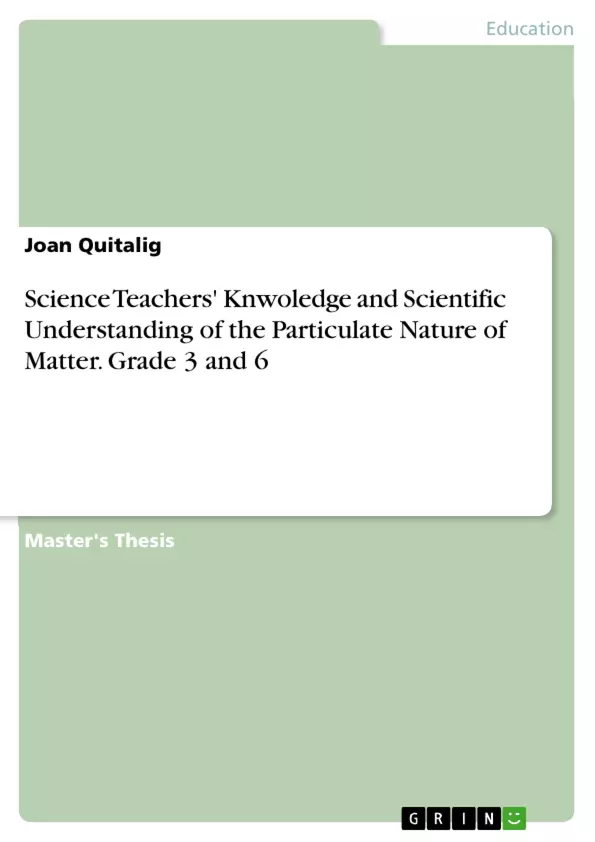This study investigated grade 3 and grade 6 science teachers’ knowledge and scientific understanding of the particulate nature of matter of public elementary school in the City Division of Catbalogan, Samar. In this regard, the study employed descriptive research designwhich involved 36 grade 3 and 36 grade 6 teachers. Data were collected using two-tier diagnostic test. Results showed that teachers have below average knowledge and exhibited no scientific understanding of the particulate nature of matter and possess several unscientific understanding.
Table of Contents
- Chapter 1: Introduction
- Background of the Study
- Statement of the Problem
- Hypothesis
- Scope and Delimitation
- Significance of the Study
- Definition of Terms
- Chapter 2: Review of Related Literature and Studies
- The Particulate Nature of Matter
- Teachers' Knowledge of Science
- Teacher's Scientific Understanding
- Factors Affecting Teacher's Knowledge and Understanding
- Studies Related to the Topic
- Chapter 3: Research Methodology
- Research Design
- Locale of the Study
- Respondents of the Study
- Data Gathering Procedure
- Research Instrument
- Data Analysis
- Chapter 4: Presentation, Analysis, and Interpretation of Data
- Teachers' Knowledge of the Particulate Nature of Matter
- Teachers' Scientific Understanding of the Particulate Nature of Matter
Objectives and Key Themes
This study aims to investigate the knowledge and scientific understanding of grade 3 and 6 science teachers in the City Division of Catbalogan, Samar, regarding the particulate nature of matter. The study sought to determine the level of knowledge and understanding of these teachers, identify any misconceptions they may hold, and explore potential factors influencing their understanding of this fundamental scientific concept.
- Teachers' Knowledge of the Particulate Nature of Matter
- Teachers' Scientific Understanding of the Particulate Nature of Matter
- Misconceptions About the Particulate Nature of Matter
- Factors Influencing Teachers' Knowledge and Understanding
- Implications for Science Teacher Training and Curriculum Development
Chapter Summaries
Chapter 1: Introduction provides a comprehensive overview of the research topic, outlining the background, statement of the problem, hypothesis, scope and delimitation, significance of the study, and definition of key terms.
Chapter 2: Review of Related Literature and Studies delves into existing research on the particulate nature of matter, teachers' knowledge of science, and factors affecting their understanding. It also examines relevant studies to provide a theoretical framework for the current research.
Chapter 3: Research Methodology outlines the research design, including the locale, respondents, data gathering procedure, research instrument, and data analysis techniques employed in the study.
Chapter 4: Presentation, Analysis, and Interpretation of Data presents and analyzes the findings of the study, focusing on the teachers' knowledge and scientific understanding of the particulate nature of matter. It also discusses any identified misconceptions and explores potential factors influencing their comprehension of this concept.
Keywords
The primary focus of this study is on the understanding of the particulate nature of matter, which is a fundamental concept in science. The research investigates the knowledge and scientific understanding of grade 3 and 6 science teachers in the Philippines. Key themes include teachers' knowledge, misconceptions, and the influence of factors such as curriculum, training, and experience on their understanding of this important concept.
Frequently Asked Questions
What was the main objective of the study on science teachers?
The study aimed to investigate the knowledge and scientific understanding of grade 3 and grade 6 science teachers regarding the particulate nature of matter in Catbalogan, Samar.
What is the "Particulate Nature of Matter"?
It is a fundamental scientific concept stating that all matter is made up of discrete, tiny particles. Understanding this is crucial for learning chemistry and physics.
What were the key findings regarding teacher knowledge?
The results showed that teachers had below-average knowledge and possessed several unscientific misconceptions about the particulate nature of matter.
How was the data collected in this research?
Data were collected using a two-tier diagnostic test administered to 72 public elementary school teachers (36 from grade 3 and 36 from grade 6).
What are the implications for science education?
The study suggests a need for improved teacher training and curriculum development to address these misconceptions and enhance the quality of science instruction.
- Arbeit zitieren
- Joan Quitalig (Autor:in), 2018, Science Teachers' Knwoledge and Scientific Understanding of the Particulate Nature of Matter. Grade 3 and 6, München, GRIN Verlag, https://www.grin.com/document/434219



